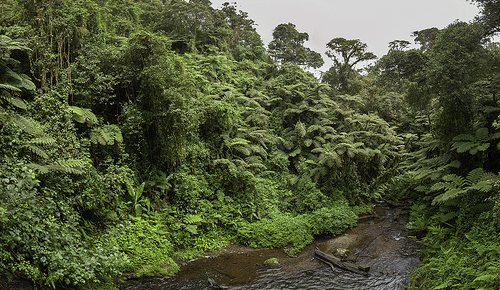
Tropical deforestation is well known to have serious negative consequences for biodiversity, terrestrial carbon sinks and the balance of atmospheric greenhouse gases. By contrast, selective logging of tropical forests is often regarded as having a lesser impact on the ecosystem particularly in long terms, even though there have been few critical evaluations of the practice, particularly in Africa. In a study published on Ecological Research a team of authors (among them, CMCC researchers A. Di Paola and R. Valentini from IAFES Division) compared field data from 511 sites in the tropical forest of Sierra Leone, Ghana, Cameroon and Gabon that were subject to different forest management practices, such as no recent logging (primary forests), selective logging (up to 30 years old) and re-grown secondary forests post clear-cutting (at least 20 years ago).
The abstract of the paper:
Tropical deforestation is well known to have serious negative consequences for biodiversity, terrestrial carbon sinks and the balance of atmospheric greenhouse gases. By contrast, selective logging of tropical forests is often regarded as having a lesser impact on the ecosystem particularly in long terms, even though there have been few critical evaluations of the practice, particularly in Africa. We compared field data from 511 plots in the tropical forest of Sierra Leone, Ghana, Cameroon and Gabon. These plots were subject to different forest management practices: no recent logging (primary forests), selective logging (up to 30 years old) and re-grown secondary forests post clear-cutting (at least 20 years ago). Our findings suggest that the vertical structure and plant richness of the selectively logged and secondary forests change in different amplitude from those of primary forests, but stem density and the prevalence of vine and weed species differ greatly. We show that the effects of selective logging are greater than those expected simply from the removal of commercial species, and can persist for decades. Selective logging, unless it is practiced at very low harvest intensities, can significantly reduce the biomass of a tropical forest for many decades, seriously diminishing aboveground carbon storage capacity, and create opportunities for weeds and vines to spread and slow down the ecological succession.
Read the full version of the paper:
Gatti R. C. , Castaldi S., Lindsell J., Coomes D., Marchetti M., Maesano M., Di Paola A., Paparella F., Valentini R.
The impact of selective logging and clearcutting on forest structure, tree diversity and above-ground biomass of African tropical forests
2015, Ecological Research, 1-14, DOI: 10.1007/s11284-014-1217-3


